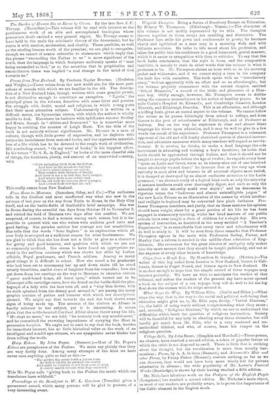From Rome to Mentana. (Saunders, Wen and Co.)—Tlus authoress tells
in the liveliest and most unaffected way what she saw in the autumn of last year on the way from Turin to Rome, in the Holy City itself, and on the battle-fields of Garibaldi's brief campaign. She was in Rome during the eventful ten days from October 24 to November 3, and visited the field of Montana two days aftor the conflict. We are surprised, of course, to find a woman among each scenes, but it is im- possible to quarrel with one who writes with uniform good taste and good feeling. She parades neither her courage nor her sensibilities. She tolls that the words " Sono Inglese " is an explanation which all over Italy is accepted as a sufficient reason for utter fearlessness. We are glad to think that she has done not a little to give us a character for gaiety and good-humour, and qualities with which we are not so commonly credited. She seems to have found an appropriate re- ward in the uniform courtesy which was shown her alike by Italian officials, Papal gendarmes, and French soldiers. Among so many good things it is difficult to select. How she raced a fat gendarme who had been set to accompany her up and down stairs till he stood utterly breathless, amidst roars of laughter from his comrades: how she got down from her carriage ou the way to Montana to examine certain "queer card-board boxes, all burst open," which turned out to be Chassepot rifle cartridge-cases, how she found on the battle-field the pho- tograph of a lady with the face torn off, and a "tiny blue flower, with its stalk splashed from the dreary pool around it," are among the many graphic touches of pathos and humour with which her descriptions abound. We might say that towards the end the book shows some signs of being made up. The account of the cholera at Albano is hardly relevant to her subject, yet it is interesting. It seems plain that the noble-hearted Cardinal Albini almost threw away his life. -" Ho slept no more," we are told, " he scarcely took any nourishment," and he committed the crowning imprudence of carrying the Host in procession barefoot. We ought not to omit to say that the book, besides its immediate interest, has no little historical value as the work of an intelligent and candid eye-witness, wh ose sympathies never hinder her from telling the truth.


































 Previous page
Previous page